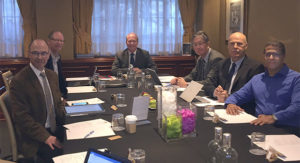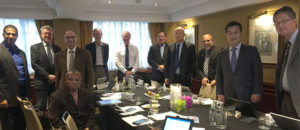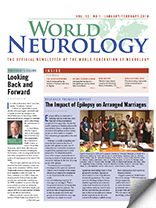William Carroll, MD
It is with much pleasure that I write this, my first “President’s Column.”
It affords an opportunity to speak directly with neurologists worldwide and to update them of the changes in the World Federation of Neurology (WFN) that naturally follow a change in leadership and to acknowledge the contributions of many.

Officers and trustees at their first Trustees meeting Feb. 12, 2018, in London, before the combined
trustees and regional presidents strategy meeting. From left to right: Morris Freedman,
elected trustee; Richard Stark, treasurer; William Carroll, president; Ryuji Kaji, vice president;
Wolfgang Grisold, secretary-general; Riadh Gouider, elected trustee. Not pictured: Steven
Lewis, elected trustee, who joined the meeting on Tuesday.
To Raad Shakir, who has stepped down at the completion of his four-year term as president, the re-election of Riadh Gouider as trustee for another three years, and to those who unsuccessfully contested elections held during the WCN Kyoto, I offer my congratulations for their effort and gratitude for their demonstration of commitment to the work of the WFN.
This time also marks the end of the two years that the WFN committee chairs and many on the committees will have served. Traditionally, there is a change in personnel in all committees every two years. To them, on behalf of the WFN, I thank you wholeheartedly. Without their unselfish involvement and valuable contributions, the WFN would not run as smoothly and as successfully as it does. As with many committees, their contribution largely goes unnoticed by the membership but certainly not by the officers and trustees.
Without a doubt, however, the contributions of Raad Shakir as president for the last four years was outstanding. Consequently, although there is much to inform you of, I intend to limit this for now and spend the bulk of this report touching on the successes of Dr. Shakir’s term.
Dr. Shakir has been a prominent figure in neurology in the United Kingdom for more than 20 years and was one of the key people in the organization of the successful 2001 World Congress of Neurology, which was held in London. My acquaintance and knowledge of him began at that time and has largely paralleled my own involvement with the WFN. I have been fortunate to witness first-hand the contributions he has made to our organization.

Officers, trustees, and regional presidents attending the combined strategy meeting in London. From left to right: Riadh Gouider; Franz Fazekas, president-elect, European Academy of Neurology; Yomi Ogun, president, African Academy of Neurology; Morris Freedman; Richard Stark; William Carroll, WFN president; Marco Medina, president, Pan-American Federation of Neurological Societies; Wolfgang Grisold; Ralph Sacco, president, American Academy of Neurology; Beom-Seok Jeon, president, Asian and Oceanian Association of Neurology; and Ryuji Kaji.
He has provided dedicated service over many years, aided by his multicultural education and experience, and his seemingly boundless energy and enthusiasm. With his detailed understanding of the varied cultural sensitivities in the global neurological community, he has been a successful leader.
Before being elected to the position of WFN’s Secretary-Treasurer General in 2009, he had assumed this position in 2006 on the unexpected retirement of the incumbent and he immediately displayed these skills and commitment in this new role. With then-WFN-President Johan Aarli, he was able to negotiate an understanding with the Peoples Republic of China that enabled the Chinese Neurological Society to join the WFN without fracturing the memberships of the Hong Kong and Taiwanese neurological societies. This was no easy task, as two previous presidents had been unsuccessful in the same endeavor.
His presidency of the WFN commenced in 2013 and was marked by a commitment to empower the regional organizations of the WFN. This was crowned by the establishment of the African Academy of Neurology (AFAN) in 2015 and its first Congress in 2017 in Hammamet, Tunisia. Although Dr. Shakir did not instigate the WFN African initiative in 2006, there is no doubt in my mind that it was his vigor and leadership that enabled the initiative to be transformed into AFAN as an active and independent regional affiliated WFN organization.
At the same time, Dr. Shakir has also prosecuted the African initiative plan for the WFN to develop four neurological training centers, two in Anglophone and two in Francophone Africa. A major limitation has been the funding of trainees in these centers. Through his persistence and endeavor, enduring funding is now being established that will benefit neurology in Africa. Such an outcome will both free up valuable WFN funds for additional educational projects and elevate the visibility and support for the WFN. The benefit of the increasing recognition of the WFN as a leader in neurological education in one of the most difficult yet needful areas of the world will pay dividends for many years, particularly in lifting the standard of neurological care in Africa.
The final development and the establishment of the Pan American Federation of Neurological Societies (PAFNS) also occurred in Latin America during his presidency. It is fair to say that his influence and guidance were fundamental in driving this successful outcome. As a consequence of these two initiatives, the WFN now has affiliated regional organizations in six areas, approximating those of the World Health Organization (WHO). Importantly, these afford more effective and immediate interaction between the WFN and the regions and regional member societies. It is no boast to say that the vision of regional empowerment is transforming communication within the WFN and that this in turn advances engagement at all levels of the WFN.
Dr. Shakir has displayed the same dedication and skill in guiding the WFN dealings with the WHO. Intimate involvement with WHO-related activities such as the Neurology Atlas of 2017, and in him heading the neurology Topic Advisory Group for the revision of the International Classification of Diseases (ICD-11), have required enormous effort, patience, and skill over a considerable period of time.
The WFN and the global neurological and stroke communities are indebted to Dr. Shakir for his Churchillian doggedness in dealing with the WHO, which at times has appeared out of touch with reality and driven by internal bureaucratic imperatives. The interaction between the WFN and the WHO is leading to a fundamental change in the way the WHO views stroke (as a disease of the brain), and this should be reflected in ICD-11. Both will be advantageous to the advancement of neurological care worldwide.
The outbreak of the Zika virus in early 2015 afforded another example of Dr. Shakir’s ability to mobilize rapidly the required WFN response. Within weeks of it becoming recognized as a major threat to health, particularly to fetal health and a potential risk for children and adults of an acute paralytic illness resembling Guillain-Barre syndrome, the WFN had in place an international committee of experts headed by Prof. John England.
The WFN Zika experience, particularly the need to act rapidly with other organizations in developing a multiskilled response, gave direction to the role of the WFN as a natural lead point for like organizations. Both the World Brain Alliance and the Global Neurology Network, which commenced life under President Hachinski and Vice President Hacke, respectively, are natural partners for the WFN. Dr. Shakir has recognized this “natural fit” and has emphasized the important role all three may need to play in the future. To assist this relationship, he made special provision for all to be involved in the biennial WCN scientific program.
It is fitting that Dr. Shakir’s presidency should terminate with arguably one of our most successful World Congresses of Neurology, in Kyoto. By numbers of delegates (more than 8,500), number of participating countries (110), number of bursaries offered to young neurologists from low- and low-middle-income countries (200), and our most profitable despite the highest dollar value support for the faculty to make them feel appreciated, it was a success. As the chair of the Congress committee for 2017, I can attest to both the efforts of the Japanese Society of Neurology and Dr. Shakir’s guiding influence in the success of this WCN1.
Dr. Shakir will be missed, but as is his nature, he has offered his advice and service should they be needed in the future. We all wish him and his wife, Nada, the best of futures and more quality time for each other and their extended family.
New Developments
I will now briefly summarize some of the other developments since Jan. 1, which will be dealt with in more detail in my next reports.
1. The trustees and officers of the WFN met in London in mid-February for a strategic planning meeting and were joined by the presidents of the six regional organizations. The full complement of attendees met over two consecutive days of intense discussions, preceded and succeeded by more specific and focused topical meetings which all lasted four days.
2. The outcomes were a thorough review of WFN education and related programs, including the annual research Grant Program, Department Visits, regional teaching courses in Africa, regional training Centers in Africa, plans to ensure the successful continuation of the AFAN, interaction with the West African Academy of Medicine, and the goals, financing, and outcome measures of all training centers before they are established, and a review of support for trainees in these programs. All in all, once implemented, these measures should ensure their successful continuation.
3. Review and revamp of website, social media platforms, and publications (mainly World Neurology) with uniform external branding.
4. Preliminary work on the needs registry to be developed by the regional organizations with their member societies.
5. A review of each committee and its role, activity, and constituents.
6. An agreement to hold this same strategic review biennially.
7. A review of the AAN/WFN Continuum program developed new criteria for its continuation, which will be instituted gradually and involve an appeal process to minimize any inadvertent hardship.
8. Importantly, it was agreed to hold the following meetings during 2018.
8.1 Congress Committee incorporating the 2019 Scientific Program, Teaching Course Committee, and Tournament Committee meeting in April during the Los Angeles AAN meeting — dates to be confirmed.
8.2 Finance Committee and other WFN Committee meetings during the EAN meeting in June in Lisbon — dates to be confirmed.
8.3 The Council of Delegates and AGM of the WFN including the election of a Secretary-General and an elected Trustee, in October during the Berlin ECTRIMS meeting — dates to be confirmed.
All 2016 constituted committees will be advised in the near future whether they will continue to operate into 2018, join with the newly constituted 2018 committees for a variable period, or disband.
It was clear to all who attended the strategy meeting that it was informative and empowering, and the inclusivity was team-building, which bodes well for the progress of the WFN through 2018.
Finally, in closing and in the interests of openness and transparency, the executive of the WFN would be pleased to engage in dialogue at any level on these and any other matters. Until next time, I wish all a successful and productive 2018.
Reference
1. Carroll W M (2017). The need for a Global Neurological Alliance, JNeuroSci. 379;321-323.
